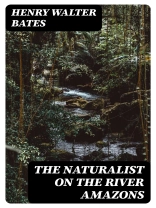In ‘The Naturalist on the River Amazons, ‘ Henry Walter Bates embarks on an enthralling exploration of the Amazon rainforest, blending vivid descriptions of the landscape with a meticulous examination of its diverse flora and fauna. Written in the mid-19th century, the book captures the fervor of the Victorian era’s scientific inquiry, showcasing Bates’ masterful, lyrical prose that balances rich narrative with rigorous observation. With an ethnographic lens, he presents not only the biological wonders of the Amazon but also the complexities of the indigenous cultures, crafting a seminal text that intertwines adventure and science within a burgeoning field of natural history. Bates, a dedicated entomologist and a pioneering figure in the study of biodiversity, spent over eleven years in South America. Influenced by the intellectual currents of his time and his friendship with contemporaries like Charles Darwin, Bates aimed to elucidate the mechanisms of natural selection and adaptation within the Amazon’s ecosystems. His firsthand experiences and challenges faced during his expeditions lent authenticity and depth to his narrative, forging a deeply personal yet scholarly account of the natural world. I highly recommend ‘The Naturalist on the River Amazons’ to readers with an interest in natural history and adventure literature. Bates’ insights into biodiversity, coupled with his engaging storytelling, make this work not only a vital historical document but also a captivating narrative that continues to resonate with contemporary discussions around ecology and conservation.
About the author
Henry Walter Bates (1825-1892) was an eminent English naturalist and explorer whose work has had a lasting impact on the fields of entomology and biogeography. Bates is best known for his expedition to the Amazon Basin, a daring journey he embarked upon alongside the famous naturalist Alfred Russel Wallace in 1848. His extensive research in the Amazon over a period of eleven years led to the publication of his most notable work, ‘The Naturalist on the River Amazons’, first published in 1863. In this seminal book, Bates provided vivid descriptions of the rich biodiversity he encountered, as well as insightful observations on the behavior and ecology of the species he studied. Furthermore, Bates contributed to the theory of mimicry in evolutionary biology, known as Batesian mimicry, through his observations on butterfly species. His work has been characterized by a meticulous attention to the interconnections between species and their environments, and his literary style often reflects his profound respect and awe for nature. Bates’s expertise and pioneering research continue to be referenced and studied by naturalists and biologists, underscoring his important legacy in natural science literature.












